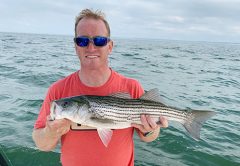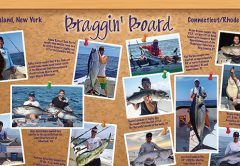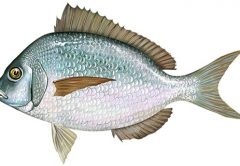With cod being caught right now off Point Judith and St. Paddy’s Day just around the corner, many Rhodys will be celebrating with some of our fresh-from-the-sea fish & chips and our famous local brews. We asked around and got a few favorites to share with you…but first…for authentic fish & chips, even some anglers don’t know that cod is the way to go!
Not so, say some of our readers…there are restaurants serving up fish & chips made with sole, tilapia and haddock, but here’s the real scoop: fish & chips originated with the common cod…the lovely, lowly cold water white fish found on both sides of the Atlantic. Long known as the working man’s lunch in Ireland and England, fried fish & chips may first have been introduced to the British Isles by the Portuguese and Spanish. Simply called “pescado frito,” or fried fish, the dish was prepared by flouring white fish and then frying it in a good amount of olive oil and seasoning it only with salt. It most likely derived from the earliest days of exploration when salting was the best method of food preservation and cod was well-matched to it because of its lack of fat–if dried well, cod would not spoil as quickly as fattier fishes.
In his book, Cod: A Biography of the Fish that Changed the World, Mark Kurlansky states that it was the Basques–the people of Northern Spain and Southwest France–who promoted salt cod, as they excelled in both salting and fishing. They were a seafaring people who went far to hunt whales. Kurlansky suggests that they even traveled as far as North America, where they hit upon large schools of cod in the Grand Banks off the coasts of Canada and Newfoundland, but not wanting to give away their sweet spot, they kept it secret. Being familiar with salting whale meat, the Basque explorers tried it on cod and the salted cod boom was born–the best bet to stave off hunger during long sea voyages. Mediterranean fresh cod recipes followed, years later of course, but including lightly fried in olive oil and sauced with lemons and capers or tomatoes and olives.
The “chips,” however, were indeed added by the Brits in the mid-1800s, when “chip shops” started popping up around London, as described by Dickens himself in A Tale of Two Cities as vendors selling “husky chips of potatoes” and recorded in Oliver Twist as “fried fish warehouses.” While potatoes fried in oil may have originated in Belgium as the French “Pommes Frites,” the Brits took them to heart, and the “Irish Ordinary” was born–a shop on every London corner selling fried potatoes, beer and meats to mostly single working men who couldn’t for one reason or another be bothered to cook–the forebear of today’s Irish Pub!
The two great tastes of fried fish and chips, however, were capitalized upon by a Jewish immigrant to London, Joseph Malin, who opened the first fish & chips shop in the East End in 1860-65. For centuries, Mediterranean (Sephardic) Jews had been eating fish fried in oil, served hot or cold, and later began selling it to Catholics who were forbidden to eat meat on Holy Days. Malin struck upon an idea rooted in success as Irish-Catholic workers flooded Victorian London in response to the growing need for manual laborers. But Kurlansky goes so far as to state that long before Columbus discovered America, fish mongers from Bristol were selling Atlantic cod to rest of the Continent!
“To the glee of the British press, a letter has recently been discovered,” writes Kurlansky. “The letter had been sent to Christopher Columbus…from Bristol merchants…and alleged that he knew perfectly well that they had been to America already. It is not known if Columbus ever replied. He didn’t need to. Fishermen were keeping their secrets, while explorers were telling the world. Columbus had claimed the entire new world for Spain.”
Whoa! Let’s not go so far as to amend the history books, but suffice it to say that Rhodys’ beloved fish & chips are made of cod and are as synonymous with Irish Pubs and St. Paddy’s Day as micro-breweries are with Rhode Island! And what better combination than serving fish & chips with beer? Beer-battered, deep-fried, local- caught cod has become a Rhode Island tradition in March when the cold-water cod are more plentiful than other fish. Atlantic Cod are common to the entire New England coast up to Canada and Newfoundland, as Kurlansky states, and particularly in the U.S. Georges Bank, the elevated sea floor off the coast of Cape Cod and not far from Rhode Island. But because of cod’s commercial popularity and the use of trawling, it is unfortunately on the endangered watch list. However, Monterey Bay’s Fish Watch recommends hand-line caught cod as a good alternative…good news for anglers and foodies alike!
If you’re not a true believer that cod is the only way to go with fish & chips, some alternatives we’ve found on RI menus include wild sole, farmed tilapia, and local haddock, like that served at the Whiskey Republic Irish Rock Bar & Sports Pub on the water in Providence. Now, that’s a mouthful! But for a real mouthful, treat yourself to their Narragansett Beer-battered Fish & Chips. Phil Robinson, the new chef at The Whiskey Republic, will start off St. Patrick’s day by offering a traditional Irish Breakfast in the pub and then move onto other Irish classics including his famous fish & chips. While his fish is battered with a mix of Narragansett Beer and some previously secret ingredients (see recipe below), Chef Phil says the real secret to a crispy but light fish fry is getting the batter bubbly and the fish fresh from local sources.
“I get my fish from Metro Lobster in Galilie,” says Chef Phil. Since Galilie is the fishing village off Point Judith where the cod are jumping right now, we asked Chef Phil if he might replace haddock with cod in his fish & chips this St. Patrick’s Day. “I wouldn’t for our fish & chips that’s on the menu, but I would certainly use it as a daily special!”
Ken Casey, owner of the the Whiskey Republic as well as frontman of the punk bank the Dropkick Murphys, promotes the pub as celebrating St. Paddy’s with an all-day Irish Menu, live Irish dancers and music–from traditional bagpipers and drums to Irish rock–and a special Irish brew. But we also tasted several RI beers from local breweries that go great with fish & chips including Newport Storm’s Hurricane Amber Ale or Trinity Brew House’s Rhode Island IPA. “And I would recommend any of Narragansett’s beers,” says Chef Phil.
And let’s not forget the whiskey. The Whiskey Republic offers an entire whiskey menu, from Irish whiskey to single-malt scotches and blends.










